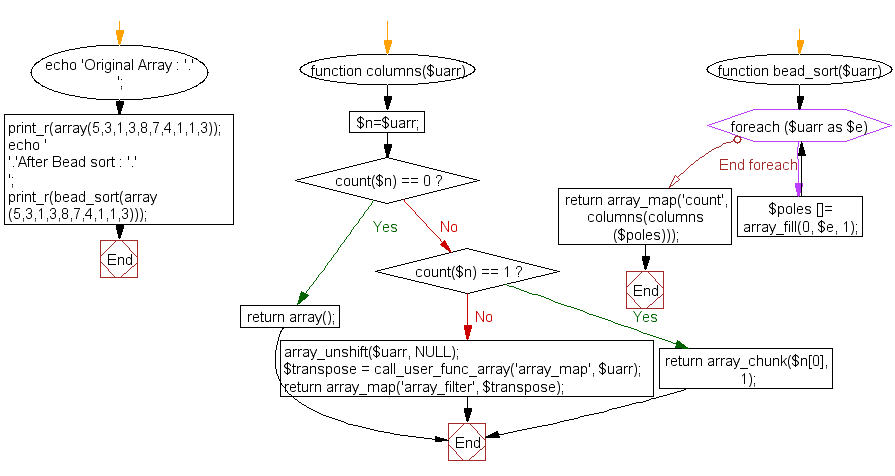PHP Array Exercises : Sort an array of positive integers using the Bead-Sort Algorithm
PHP Array: Exercise-10 with Solution
Write a PHP program to sort an array of positive integers using the Bead-Sort Algorithm.
According to Wikipedia "Bead-sort is a natural sorting algorithm, developed by Joshua J. Arulanandham, Cristian S. Calude and Michael J. Dinneen in 2002. Both digital and analog hardware implementations of bead sort can achieve a sorting time of O(n); however, the implementation of this algorithm tends to be significantly slower in software and can only be used to sort lists of positive integers".
Input array : Array ( [0] => 5 [1] => 3 [2] => 1 [3] => 3 [4] => 8 [5] => 7 [6] => 4 [7] => 1 [8] => 1 [9] => 3 )
Sample Solution:
<?php
function columns($uarr)
{
$n=$uarr;
if (count($n) == 0)
return array();
else if (count($n) == 1)
return array_chunk($n[0], 1);
array_unshift($uarr, NULL);
$transpose = call_user_func_array('array_map', $uarr);
return array_map('array_filter', $transpose);
}
function bead_sort($uarr)
{
foreach ($uarr as $e)
$poles []= array_fill(0, $e, 1);
return array_map('count', columns(columns($poles)));
}
echo 'Original Array : '.'
';
print_r(array(5,3,1,3,8,7,4,1,1,3));
echo '
'.'After Bead sort : '.'
';
print_r(bead_sort(array(5,3,1,3,8,7,4,1,1,3)));
?>
Sample Output:
Original Array :
Array
(
[0] => 5
[1] => 3
[2] => 1
[3] => 3
[4] => 8
[5] => 7
[6] => 4
[7] => 1
[8] => 1
[9] => 3
)
After Bead sort :
Array
(
[0] => 8
[1] => 7
[2] => 5
[3] => 4
[4] => 3
[5] => 3
[6] => 3
[7] => 1
[8] => 1
[9] => 1
)
Flowchart:

PHP Code Editor:
Contribute your code and comments through Disqus.
Previous: Write a PHP script to calculate and display average temperature, five lowest and highest temperatures.
Next: Write a PHP program to merge (by index) the specified two arrays.
What is the difficulty level of this exercise?
Test your Programming skills with w3resource's quiz.
PHP: Tips of the Day
How to Sort Multi-dimensional Array by Value?
Try a usort, If you are still on PHP 5.2 or earlier, you'll have to define a sorting function first:
Example:
function sortByOrder($a, $b) {
return $a['order'] - $b['order'];
}
usort($myArray, 'sortByOrder');
Starting in PHP 5.3, you can use an anonymous function:
usort($myArray, function($a, $b) {
return $a['order'] - $b['order'];
});
And finally with PHP 7 you can use the spaceship operator:
usort($myArray, function($a, $b) {
return $a['order'] <=> $b['order'];
});
To extend this to multi-dimensional sorting, reference the second/third sorting elements if the first is zero - best explained below. You can also use this for sorting on sub-elements.
usort($myArray, function($a, $b) {
$retval = $a['order'] <=> $b['order'];
if ($retval == 0) {
$retval = $a['suborder'] <=> $b['suborder'];
if ($retval == 0) {
$retval = $a['details']['subsuborder'] <=> $b['details']['subsuborder'];
}
}
return $retval;
});
If you need to retain key associations, use uasort() - see comparison of array sorting functions in the manual
Ref : https://bit.ly/3i77vCC
- New Content published on w3resource:
- HTML-CSS Practical: Exercises, Practice, Solution
- Java Regular Expression: Exercises, Practice, Solution
- Scala Programming Exercises, Practice, Solution
- Python Itertools exercises
- Python Numpy exercises
- Python GeoPy Package exercises
- Python Pandas exercises
- Python nltk exercises
- Python BeautifulSoup exercises
- Form Template
- Composer - PHP Package Manager
- PHPUnit - PHP Testing
- Laravel - PHP Framework
- Angular - JavaScript Framework
- Vue - JavaScript Framework
- Jest - JavaScript Testing Framework
